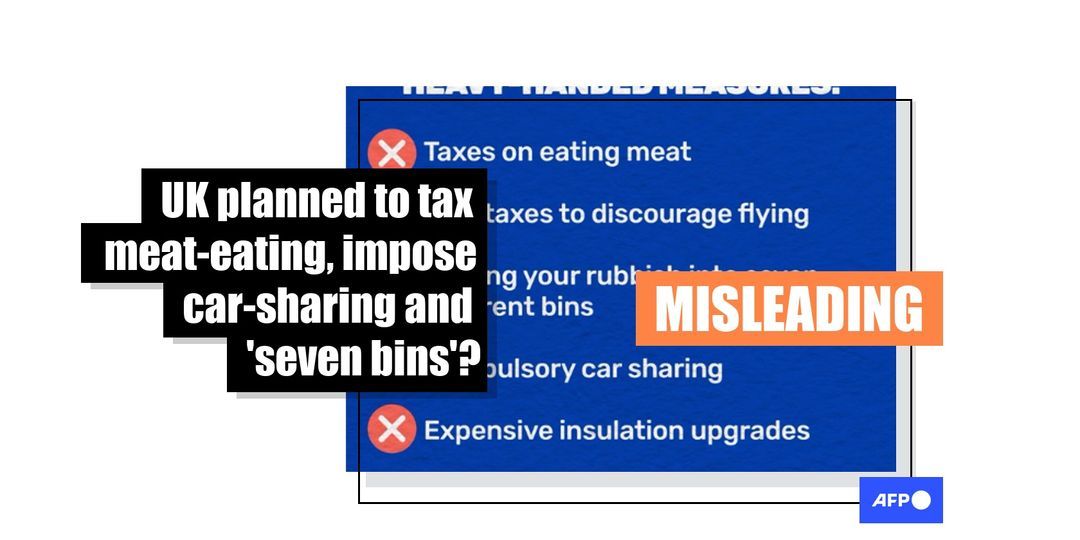
Britain’s Prime Minister Rishi Sunak vowed to halt supposed measures to tax meat-eating, make people sort their rubbish into seven separate bins and impose compulsory car-sharing. Analysts and members of his own party said the pledge was misleading: such measures were never government policy.
“We will never impose unnecessary and heavy-handed measures on you, the British people. We will still meet our international commitments and hit Net Zero by 2050,” Sunak said in a tweet (archive) on September 20, 2023, marking a major climate announcement.
It included a graphic stating: “We’re stopping heavy-handed measures: Taxes on eating meat / New taxes to discourage flying / Sorting your rubbish into seven different bins / Compulsory car sharing / Expensive insulation upgrades.”
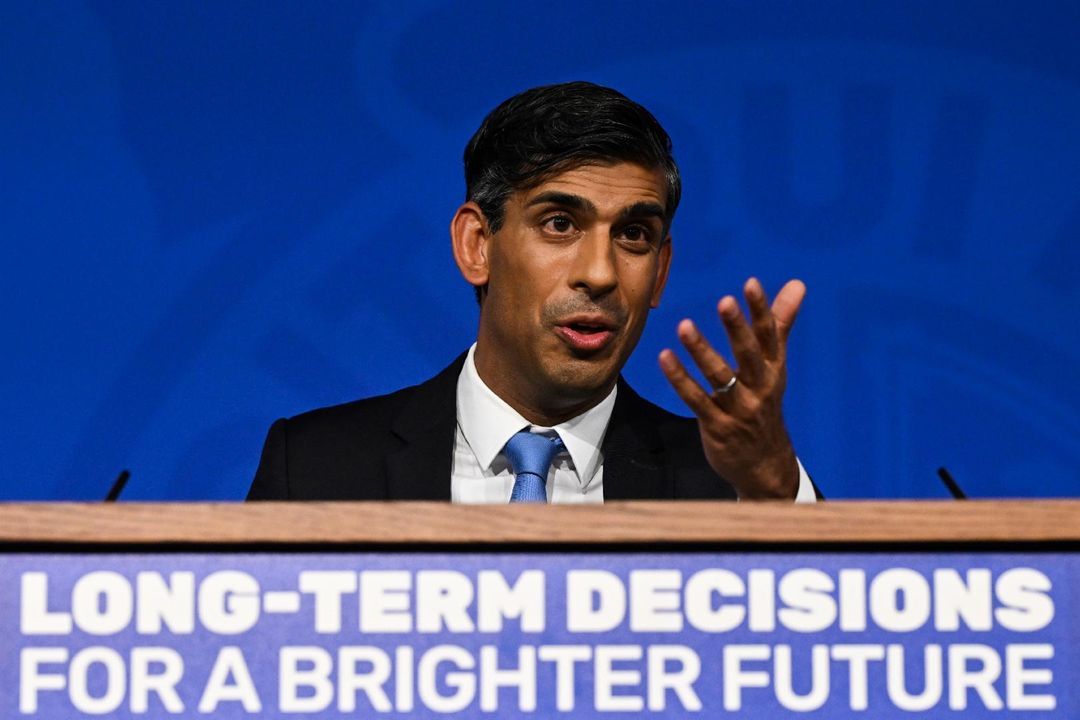
The claim prompted fact-checks in various British media (1, 2, 3) and criticism from numerous observers, including several within the prime minister’s Conservative party.
“This is cynical beyond belief. The PM is pretending to halt frightening proposals that simply do not exist,” tweeted Sunak’s former environment minister Zac Goldsmith (archive). He resigned in June, saying Sunak had abandoned the previous government’s climate commitments.
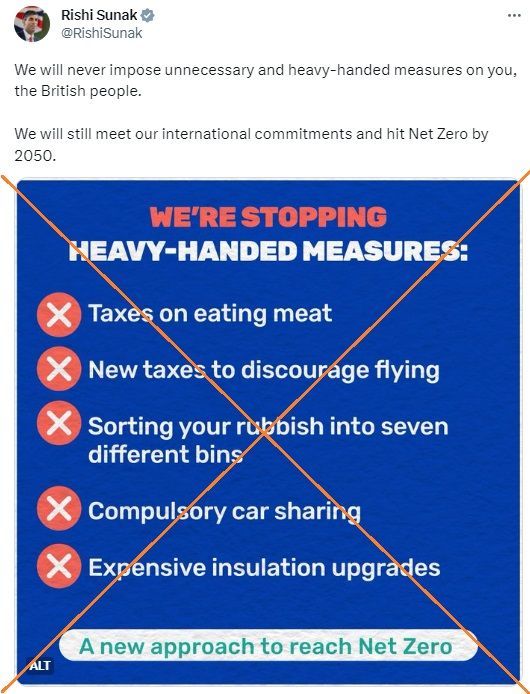
“A lot of straw men have been offered up which simply weren’t policy,” tweeted Conservative MP Simon Clarke. “Nobody serious in politics was talking about banning flying, taxing meat etc.” (archive).
Questioned on BBC Radio 4, Sunak defended his claims (archive), saying the measures were reflected in advisory documents published by the Climate Change Committee (CCC), an independent advisory body, and the 2021 Environment Act (archive).
In a report released in June 2023 (archive), the CCC called on the government to “empower people to make green choices by communicating the most impactful ways to reduce emissions, such as changing car travel, home energy use and dietary behaviours and reducing air travel, and support people to make these choices including through regulation and incentives.”
AFP reviewed the documents to fact-check each of Sunak’s claims.
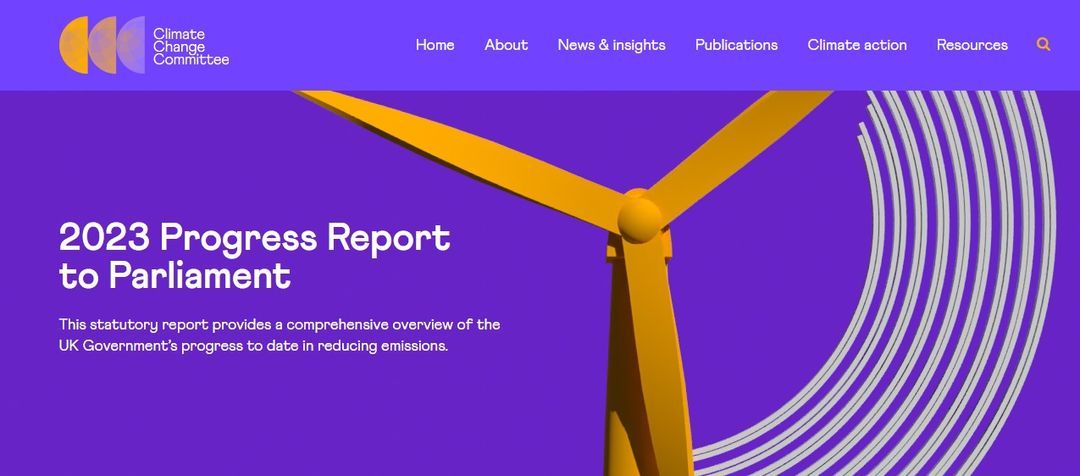
‘Meat tax’
Sunak told Radio 4 that the CCC called for “an accelerated shift away from dairy and meat”. He claimed that “it also said we’ll have to implement measures to bring that about.”
The CCC’s 2023 report recommended the government “take low-cost, low-regret actions to encourage a 20% shift away from all meat by 2030, rising to 35% by 2050, and a 20% shift from dairy products by 2030, demonstrating leadership in the public sector whilst improving health.”
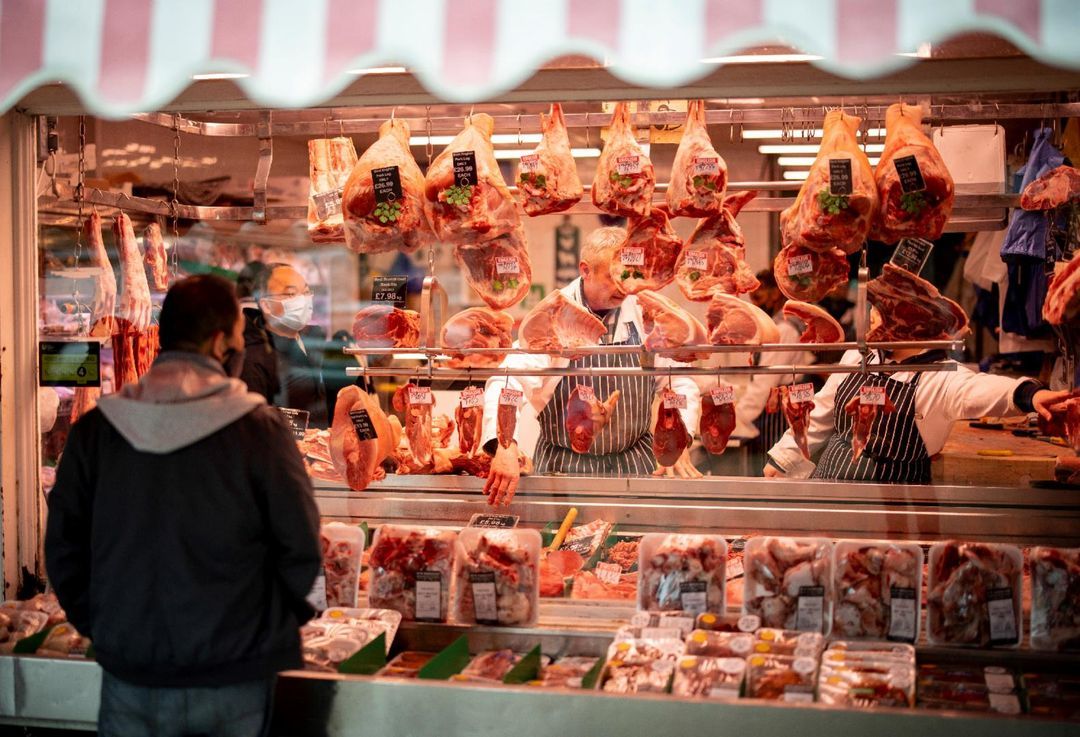
The document was a statutory progress report to parliament — not a government policy proposal. It offered an assessment of progress in reducing emissions in line with Britain’s commitment to reach net zero carbon emissions by 2050.
“As the former chief analyst on the UK government’s National Food Strategy, I can confirm there is no proposal for a meat tax,” Dustin Benton, now policy director of the Green Alliance, an independent think tank, told AFP in an email.
‘Seven bins’
Citing the Environment Act and associated consultation papers (archives here and here), Sunak told Radio 4 “there’s a very clear statement in there about moving to consistent collection for recycling, the clear implication of which is seven bins.”
The act does say that recyclable household waste must be separated into six “streams”: Glass, metal, plastic, paper and card, food waste and garden waste. Along with non-recyclables, this adds up to seven categories.
But it says the first four of these may be collected together if it is not “technically or economically practicable” to collect them separately, or if there is little overall environmental benefit in doing so.
The government’s Department for Environment, Food and Rural Affairs denied that “seven bins” had ever been a policy.
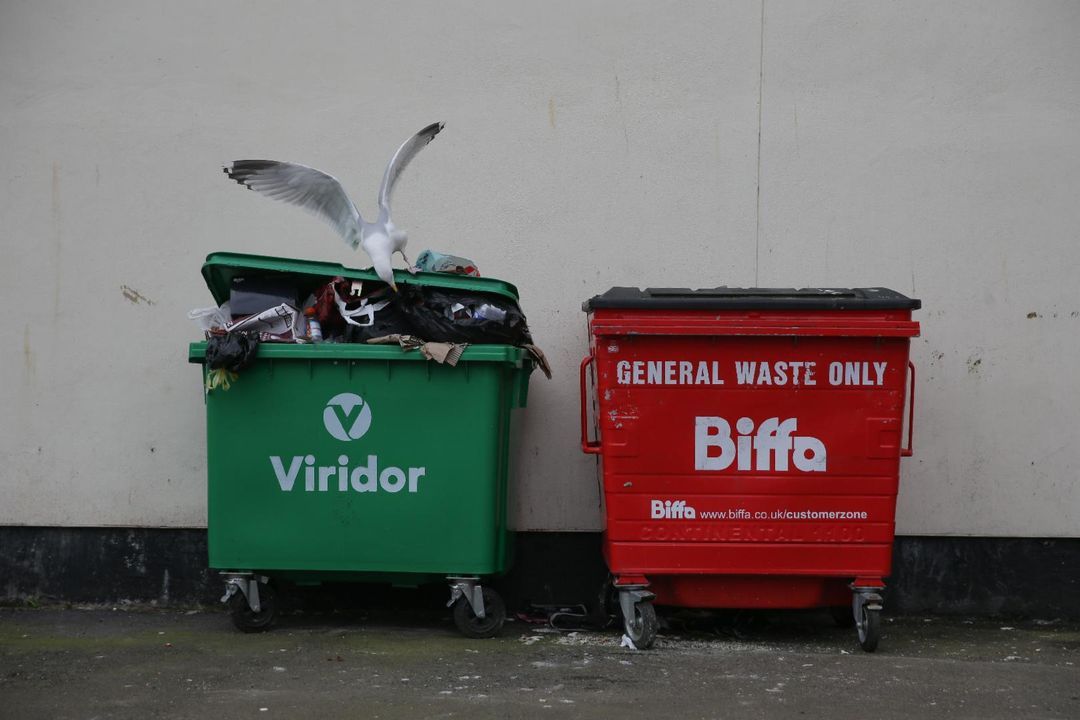
It plans to launch a new “Simpler Recycling” system, “ending the confusion over what can and can’t be recycled,” it told AFP in an emailed statement.
“The Environment Act was clear recyclable waste streams should be collected separately from each other, except where councils met clear conditions. In practice this may have led to a situation where households would need to sort their waste into multiple different containers,” it said.
“However, through Simpler Recycling we will ensure that local authorities retain the flexibility to collect the recyclable waste streams in the most appropriate way for their residents.”
In a separate statement cited by British media (archive), it added: “Whilst it was never the case that seven bins would be needed by households, this new plan ensures it.”
‘Compulsory car-sharing’
Sunak told Radio 4 that the CCC report spoke “very clearly about what they could describe as ride-sharing solutions… What it then says euphemistically is one would need to consider demand-side measures to bring that about, which are otherwise known as compulsion or taxes.”
The CCC report said there was “a clear case for demand-side policies to reduce emissions… especially on home energy use, shifting to healthier and more sustainable diets, and reducing air and car travel.”
Regarding car-sharing, it called for the government to fund local “schemes to encourage greater use of car-, lift- and ride-sharing instead of single-occupancy private car travel.”
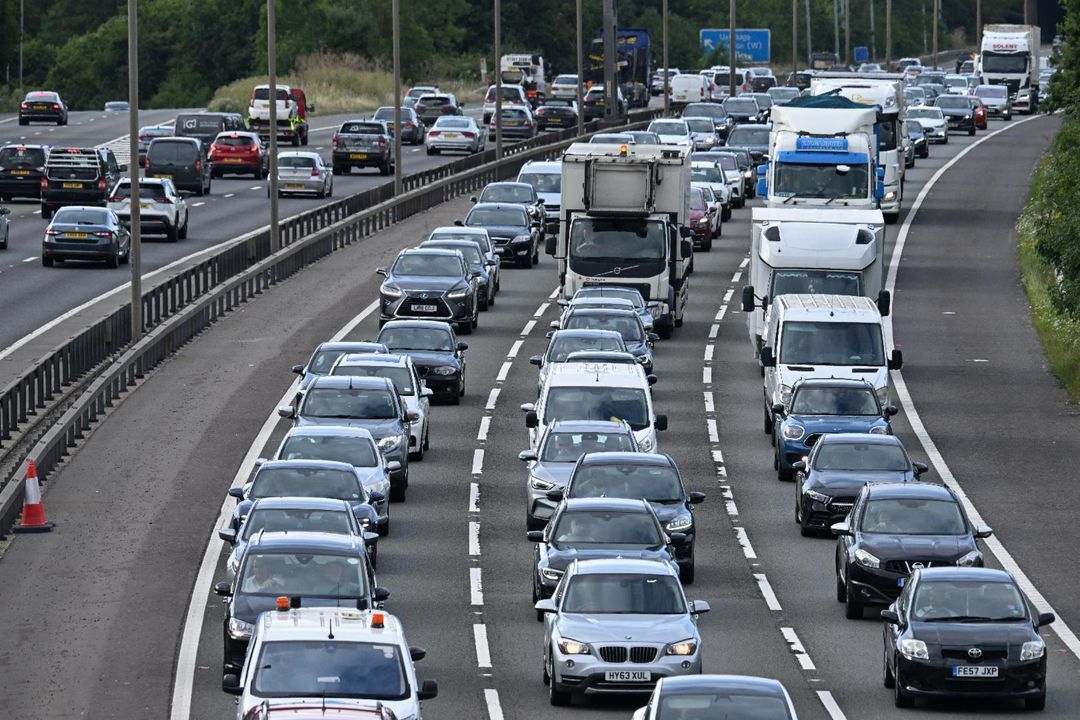
In a separate report in 2020 (archive), the CCC made recommendations for local measures such as dedicated “high-occupancy vehicle lanes”, plus “car clubs, real-time ridesharing apps and ride-pooling.”
The reports contained recommendations and did not propose compulsory car-sharing measures.
“It came as surprising news to us that the government was pursuing a policy of mandatory car-sharing,” said Julie Furnell, managing director of Mobilityways, which runs the ride-pooling platform Liftshare, in a press release.
“It would appear that the prime minister has just killed a policy that no one knew they had.”
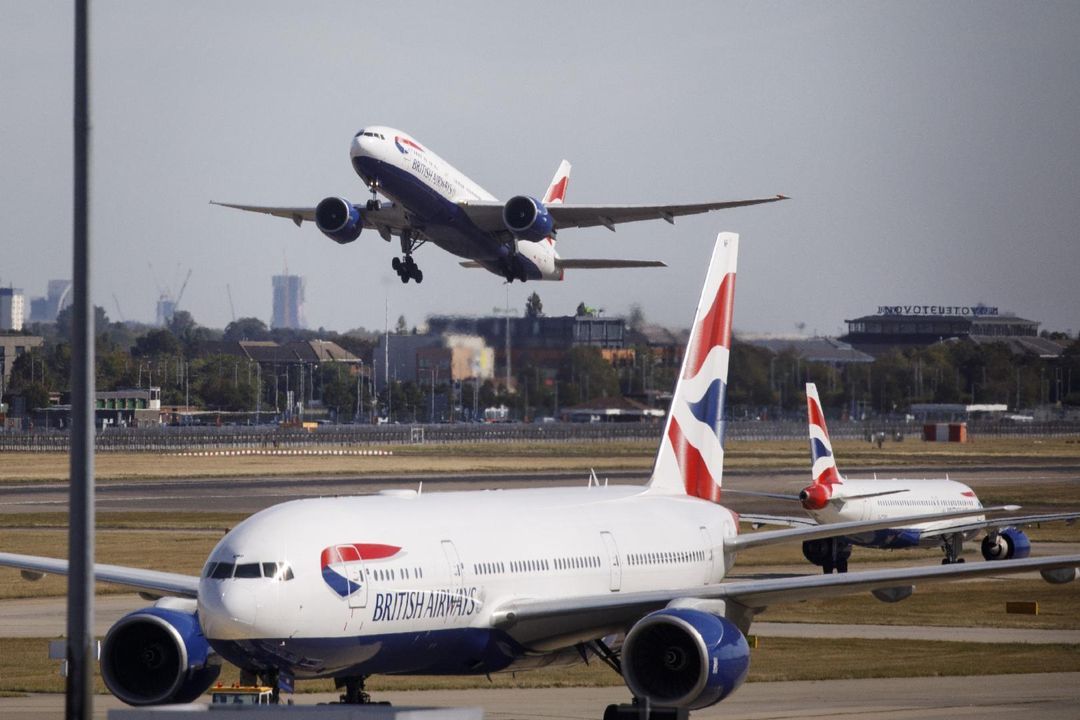
Flight taxes
Sunak vowed to spare Britons “new taxes” on flying. This was “never government policy anyway,” the UK Energy Research Centre noted – although there have been calls from green groups to make frequent flyers pay more.
The CCC report said “taxes should send clearer signals to consumers on the high emissions cost of flying,” for example by reversing a 2021 cut in air passenger duty, and that “taxation, quotas or a frequent flyer levy” could be used to reduce business flights.
Sunak cut air duty for domestic flights, effective from April 2023. The measure has not been reversed and the proposed frequent-flyer levy has not materialised.
Homes, motoring
Sunak’s announcement included changes to some policies that do exist.
“Changes to policy on the phase out date for petrol and diesel cars, for gas- and oil-fired boilers, and to energy efficiency requirements on private rented properties are significant,” said the UK Energy Research Centre in its analysis.
The prime minister’s tweet implied he would not oblige Britons to have “expensive insulation upgrades”.
The CCC’s 2023 document noted the government’s “Great British Insulation Scheme“, which can cover the cost of insulation and aims to save homeowners money on energy bills.
It recommended that funding schemes for boiler upgrades and home insulation be “adequately publicised to ensure widespread take-up”. It did not call for mandatory measures.
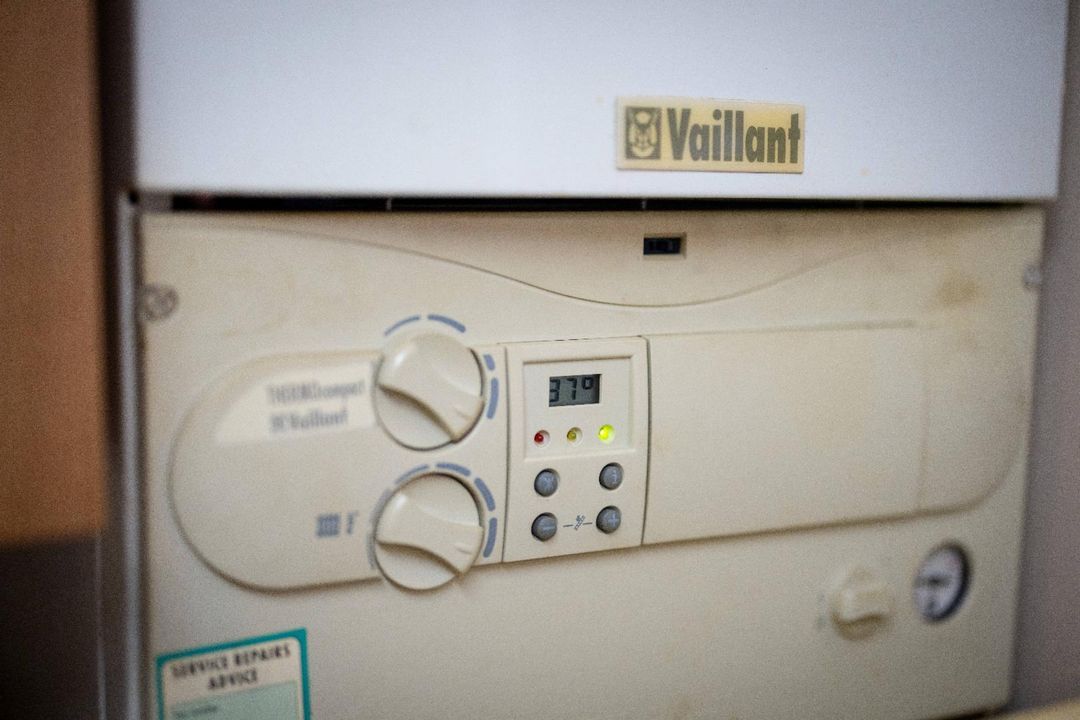
Benton of the Green Alliance said his group’s analysis indicated that dropping these three targets “means that one-fifth of the emissions savings needed to meet the UK’s carbon budgets are now not covered by any policy or ambition” and the move would raise driving and heating costs.
More of AFP’s reporting on misinformation about climate change is available here.
